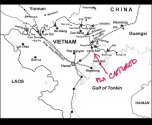Furhtermore:You could have made an effort to ACTUALLY READ A BOOK OR TWO on this topic rather than simply regurgitating spurious and specious comments from YouTube, websites like Urz etc..that would obviously never give credit least of all context about the Sino-Vietnamese BORDER CONFLICT.
The PLA leadership was certainly underwhelmed and disappointed by the performance of its forces that attacked into Vietnam but it nevertheless successfully managed to enter Vietnam and achieved it's stated objective of entering deep into Vietnamese territory and then withdrew back into China once this was accomplished.
Put it simply, the Chinese achieved it's stated STRATEGIC OBJECTIVE which was to teach Vietnam a lesson NOT CONQUER OR OCCUPY (that's a western idiotic nonsense) and BLED VIETNAM'S ECONOMY DRY while also proving to the Vietnamese leadership that their patron saint at the time which was the U.S.S.R. was not in a position to help them fight China in any meaningful way short of nuclear war. Plus, the Chinese attack on Vietnam was also a showcase to the U.S. that China is a willing and capable strategic ally against what was then seen as SOVIET UNION EXPANSIONIST POLICY. China managed to convinced ASEAN member states including your country, the PH that China will help assist and defend against any Vietnamese expansionist ambitions in the region.
Do you even know why Vietnam and China fought? What was their relative weaknesses and strengths? The massive FINANCIAL, HUMAN, AND MILITARY assistance it gave and provided to the Vietnamese efforts, first against the French colonizer, and then eventually against the U.S.
What's the Philippines claim to fame in the realm of warfare, battles? Please don't event try to bring up the Moro, and other Islamic/Muslim groups in the Philippines since they don't consider themselves "Filipino" when the very name itself is taken literally from A KING OF SPAIN LOL...Sit down.
"From the time the PRC was founded, Chinese leaders had shown a proclivity to use carefully chosen military force in territorial disputes with other countries. The PLA had been employed to uphold claims of territorial sovereignty against India in 1962 and against the Soviet Union in 1969. The PLA General Staff continued this tradition in proposing action against Vietnam. The General Staff’s proposal was carefully designed to avoid escalation lest it threaten the PRC’s economic progress. The PLA targeted just one isolated Vietnamese regiment at Trung Khanh, a border county adjacent to Guangxi Province, to teach Vietnam a military lesson for its misbehavior. Zhou Deli, the chief of staff of the Guangzhou Military Region, recalled that the General Staff believed that Trung Khanh’s isolated geographic location would allow the PLA to separate the Vietnamese outpost from any reinforcements and easily wipe it out."
China’s 1979 invasion of Vietnam can be divided into three phases. During the first phase (17–25 February), Chinese forces broke through the Vietnamese first line of resistance and captured the provincial capitals of Cao Bang and Lao Cai and a key border town, Dong Dang, the gateway to Lang Son. The second phase (26 February–5 March), consisted of a full-scale Chinese assault on Lang Son in the east and additional military engagements in the areas of Sa Pa and Phong Tho in northwestern Vietnam. The final phase(early to mid-March) saw a continued mopping-up campaign against sporadic enemy resistance while Chinese forces razed military and economic installations before withdrawing from Vietnam on 16 March.
The Chinese invasion consisted of nine field armies, three regional divisions, three artillery divisions, two antiaircraft artillery divisions, one railroad engineering division, and five engineering regiments—more than half a million combatants. Unlike Mao, Deng Xiaoping did not interfere in daily battlefield operations by giving detailed instructions from the national capital far removed from the fighting front. He did, however, spend a few hours every day in the General Staff war room reviewing battlefield reports. 1 The Chinese leader believed that only if the PLA mounted a successful operation would Western nations believe that China was a reliable friend in their struggle against Soviet expansionism. At the same time, a PLA victory would send a strong signal to Hanoi and Moscow not to undermine China’s security.

